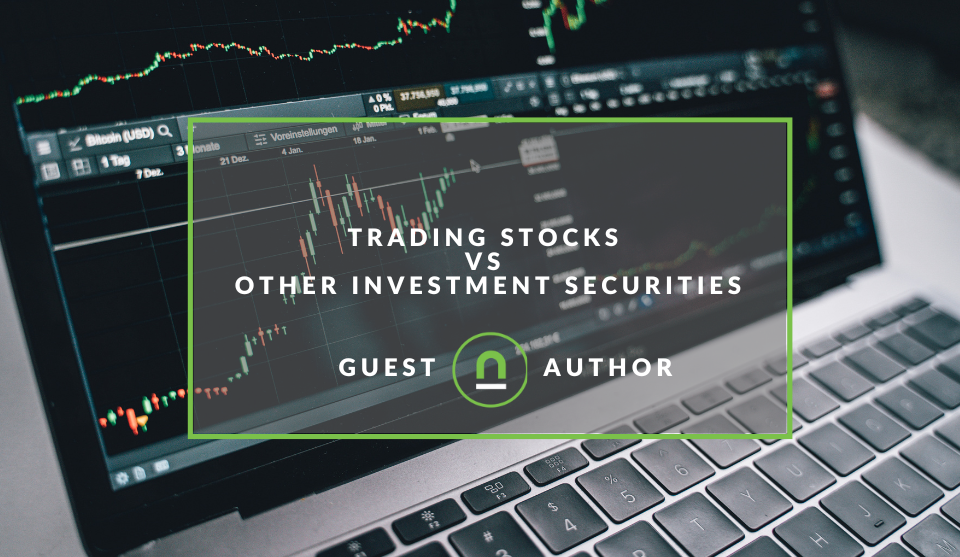Recent posts

Geek Chic
How to Replace A Broken Lenovo Laptop Screen
24 April 2025

Money Talks
Everything You Need to Know About SASSA Status Check
13 April 2025

Mind, Body & Soul
The Genetic Diversity of Cannabis Seeds
12 April 2025

Money Talks
How Small Businesses Can Leverage Blockchain Technology
02 April 2025
Popular posts
Extravaganza
Trending Music Hashtags To Get Your Posts Noticed
24 August 2018
Geek Chic
How To Fix iPhone/iPad Only Charging In Certain Positions
05 July 2020
Extravaganza
Trending Wedding Hashtags To Get Your Posts Noticed
18 September 2018
Money Talks
How To Find Coupons & Vouchers Online In South Africa
28 March 2019
Trading Stocks vs Other Investment Securities
05 April 2023 | 0 comments | Posted by Cornelia Ekong in Money Talks
In the world of fiat money, where your currency is constantly devaluing over time, you need to find other ways of storing your savings for the long term. The days of being able to park your cash in a bank account and earn an interest rate that would allow you to retire are long gone.
As currencies continue to showcase themselves as a poor store of value, savers are forced to become investors, looking to the markets for assets that either offer price appreciation above the rate of inflation or dividend and coupon payments that will offset currency debasement.
Moving out of the risk curve to put your savings to work has become the norm, and investing is an essential part of building wealth and securing financial stability for the future.
Diversifying your asset base.
In the past, you might have focused on storing your savings in physical assets like real estate and gold, which still have a place in modern-day portfolios; however, most investors tend to focus on securities like stocks, bonds, EFTs and derivatives contracts as a source of alpha.
Investing has never been more complex; with so many different investment options available, it can be challenging to decide which one is right for you.
Some of the most popular active investment options are trading stocks and other alternatives such as mutual funds, ETFs, or bonds. Choosing between trading stock and other investment options can be a difficult decision, as each has its unique advantages and disadvantages.
You might opt for one over the other during certain periods of market volatility, or you might want to adjust your allocation towards one asset over another as markets change. Understanding how these assets function will be paramount in deciding how you split up your funds and deploy them in the various vehicles you feel comfortable owning.
Stocks have become a retail trader favourite.
The stock market has become the playground of choice for many young retail investors; with today's online platforms and brokerage firms, it takes very little capital to get started and purchase a share. Depending on where you are in the world, you could focus on your local stock market or trade in larger markets like the US.
Trading stocks are popular because you could either choose to purchase a stock and hold it for the dividend payments, or you could trade them based on news, price appreciation based on company performance and market sentiment.
Alternatively, you could also short stocks if you think companies are overvalued. There are many stock strategies available, and it all hangs on your temperament, your level of activity in the market and your biases and interest towards certain sectors. If you're a big fan of tech, you would focus on tech stocks and not try to trade commodity stocks like gold miners or copper miners, for example.
Not all stocks are the same, and trying to chase capital flows will see you make plenty of mistakes; you would need to find the section of the stock market you feel comfortable with before you ever purchase a single stock.
Let's explore what stock trading is and whether it is better to trade it instead of other assets.
An Introduction to stock trading.
Stocks are one of the most popular forms of securities available in the financial market. They represent a portion of a company's ownership and allow investors to share in the company's profits and losses.
When you buy stocks, you essentially become a shareholder in the company and have a claim on a portion of the company's assets and earnings.
In the past, buying and selling stocks used to take place in physical locations, such as stock exchanges or trading floors. However, with the advancements in technology, most stock trading now takes place online through virtual platforms.
These platforms offer investors access to a wide range of stocks and securities from around the world and provide real-time information on the stock market's performance.
Stock trading vs other investment options.
Determining which investment option is right for you depends on your financial goals and investment experience. If you have a higher risk tolerance and are looking to make higher returns, trading stocks may be the right choice for you. However, if you prefer a more conservative investment approach or are looking to diversify your portfolio, you can take a closer look at other investment options as well.
Other investment options, such as mutual funds, ETFs, bonds, and real estate, offer a more diversified approach to investing.
Mutual funds and ETFs, for example, allow investors to invest in a broad range of stocks and other assets, reducing the impact of any single stock's performance on their overall investment portfolio.
Bonds offer a relatively stable source of income with lower risks than stocks, while real estate can provide a tangible asset with the potential for long-term appreciation.
It is important to note that all investment options carry risks, and it is crucial to conduct thorough research and seek professional advice before making any investment decisions.
Whether you choose stock trading or other investment options, the key to successful investing is to have a well-planned strategy that aligns with your financial goals and risk tolerance.
Conclusion.
In conclusion, both trading stocks and other investment options have their unique advantages and disadvantages, and the right choice will depend on your financial goals, risk tolerance, and investment experience.
It is crucial to research and carefully consider your options before making any investment decisions to ensure that you are making an informed choice that aligns with your long-term financial objectives.
Tell us your trading story.
Have you started trying to improve your savings by trading in the options market? How is it going? Do you have any tips you feel should be added to the list? Share it with us in the comments, and let's help others save even more.
Do you seek financial help?
Find a financial advisor or financial consultant in your area
Get started with nichemarket
If you are a financial adviser and want more leads, why not list your business with nichemarket? Registering with nichemarket is easy; all you will need to do is head over to our sign-up form and follow the instructions. If you require a more detailed guide on creating your profile or listing, we highly recommend you check out the following articles.
Recommended reading
If you enjoyed this post and have the time to dive deeper down the rabbit hole, we suggest you check out the following posts about improving your finances in South Africa.
- How South Africans Can Save Money Each Month
- The Pros and Cons Of Tap and Go Cards
- What Is A Money Market Account?
- Ways To Earn Cryptocurrency
- How To Passively Earn Cryptocurrency
- Types Of Cryptocurrency Exchanges
- How South Africans Can Buy Bitcoin
- How To Use Options To Profit From Black Swan Events
Disclaimer: This is not investment advice and is for informational purposes only. nichemarket cannot be held liable for any investment decisions made based on the information given by independent financial service providers. Under the ECT Act and to the fullest extent possible under the applicable law, nichemarket disclaims all responsibility or liability for any damages whatsoever resulting from the use of this site in any manner.
You might also like
Everything You Need to Know About SASSA Status Check
13 April 2025
Posted by Azhar Khanzada in Money Talks
A guide for 2025 for anyone looking to apply for a SASSA grant or would like to keep up to date with the status of your grant from application to red...
Read moreThe Role of Customer Service in Selecting a Forex Broker
29 March 2025
Posted by Cornelia Ekong in Money Talks
Discover why excellent customer service is crucial when choosing a Forex broker, and learn how to evaluate support quality before committing your cap...
Read more{{comment.sUserName}}
{{comment.iDayLastEdit}} day ago
{{comment.iDayLastEdit}} days ago
 {{blogcategory.sCategoryName}}
{{blogcategory.sCategoryName}}

